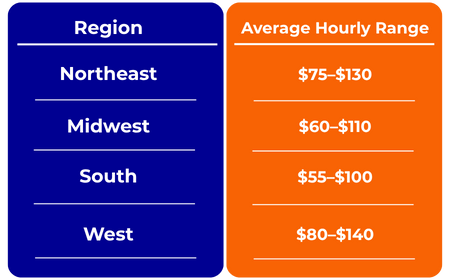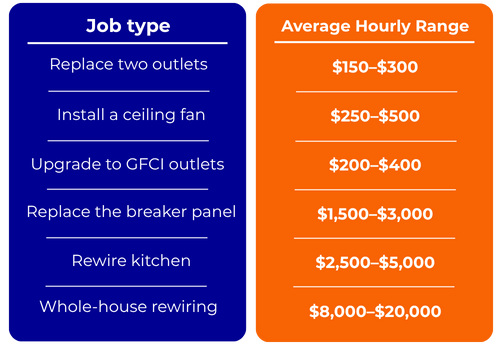Electricity keeps our homes running, from the lights above your head to the outlets powering your appliances. But when something stops working, it’s not the kind of project you want to tackle on your own. So, how much does it cost to hire an electrician, and what does a typical electrician service cost look like?
For U.S. homeowners, electrician costs can vary depending on experience, location, and job complexity. Knowing what drives those prices helps you budget wisely and hire the right professional for the job.
At Dr. Home Fixer, we connect homeowners with trusted, licensed electricians who make safety and quality a priority. This guide breaks down average pricing, factors that affect cost, and practical tips to help you get fair estimates for any electrical project.
Understanding Electrician Pricing in the U.S.

Electrical work is charged in a few common ways. Most electricians quote hourly, but some offer flat rates for predictable jobs. It’s important to understand how these pricing models work before booking your next service, especially if you want to compare electrician service costs or wiring repair pricing across different companies.
Typical Hourly Rates for Electricians
The average electrician hourly rate in the U.S. runs between $50 and $120 per hour, depending on region and skill level.
- Apprentice electricians: $40–$60 per hour
- Journeyman electricians: $60–$100 per hour
- Master electricians: $90–$150 per hour
Urban areas like Boston, New York, and San Francisco usually sit at the higher end due to the cost of living and licensing fees.
Service Call Fees and Minimums
Most electricians charge a service call fee of $75–$150, which covers travel, inspection, and the first hour of labor. If the repair takes longer, standard hourly rates apply afterward.
Some charge minimums, such as one hour, even if the fix only takes 20 minutes. It’s always worth asking how your contractor bills for short tasks so you understand the full electrician service cost before they start.
Flat-Rate vs. Hourly Pricing Models
Smaller, predictable jobs (like outlet replacements or light fixture installs) are often quoted at a flat rate, usually between $150–$400, depending on complexity. This is helpful when you want to understand a simple outlet installation cost or get a clear lighting fixture setup estimate.
Hourly pricing is more common for troubleshooting, remodels, or upgrades where the scope can change mid-project.
Cost Breakdown by Job Type

Every electrical project is unique, but knowing typical residential electrician costs and the average electrician service cost for each type of job helps set expectations.
Small Repairs & Installations
- Outlet or switch replacement: $100–$250
- Light fixture installation: $150–$400
- Smoke detector install: $100–$200 per unit
These are the kinds of jobs where homeowners usually ask about outlet installation cost or the estimated price to set up a new light. Simple repairs are fast and often completed in a single visit, though accessibility behind walls or ceilings can add time.
Medium Projects
- Ceiling fan installation: $200–$600
- New circuit or wiring for an appliance: $300–$800
- Bathroom or kitchen lighting upgrade: $500–$1,000
Medium projects require more planning and may involve cutting drywall or pulling new wires through the home. This is also where wiring repair pricing can vary more because electricians do not always know what is behind the walls until they open things up.
Large-Scale Work
Larger jobs naturally cost more because they involve higher material and permit expenses.
- Electrical panel upgrade: $1,500–$3,500
- Whole-house rewiring: $8,000–$20,000+
- New-construction wiring: $3–$7 per square foot
If you are researching an electrical panel upgrade rate for budgeting, this is the range most homeowners can expect. Big projects require licensed master electricians and often need city permits and inspections to meet code.
Key Factors Affecting Electrician Service Cost

Several factors affect the overall electrical project cost and final electrician service cost, ranging from the professional’s experience to the design of your home.
Location & Cost of Living
Regional rates make a major difference. Electricians in high-cost cities or remote rural areas typically charge more to cover travel and licensing expenses.
For instance, a panel upgrade could be $1,800 in Texas, while it might go up to $3,000 in California.
Electrician Experience Level
Apprentices are learning under supervision, so their rates are lower. Journeyman electricians can handle most residential work independently. Master electricians oversee large projects or commercial systems.
Higher skill levels mean faster work and fewer mistakes, which can actually reduce your final wiring repair pricing over time.
Time & Urgency (Emergency Services & After-Hours)
Need help on a weekend or at 2 a.m.? Expect to pay an emergency electrician cost of 1.5× to 2× the regular rate. After-hours service calls often start around $150 per hour, not including parts.
Materials, Permits & Code Compliance
Electrical parts can add up quickly. Panels, breakers, and heavy-duty wire each add material costs, plus permit fees ranging from $50–$300.
Licensed electricians ensure everything meets NEC (National Electrical Code) standards to protect your home and insurance coverage.
Home Condition, Complexity & Accessibility
Older homes often require more troubleshooting and rewiring to meet modern codes. Hard-to-reach crawlspaces or finished ceilings also increase labor time. The easier your electrician can access wiring, the lower your cost.
How to Get a Fair Estimate from an Electrician

A clear, written estimate helps prevent misunderstandings later and gives you a real picture of the electrician service cost before work begins.
What to Ask: Licensing, Insurance, References
Always confirm that your electrician is licensed and insured in your state. Ask for references or reviews to verify reliability. Quality pros are happy to provide documentation.
Bundling Jobs to Minimize Service Call Fees
If you need several small tasks, like swapping outlets and adding a light fixture, bundle them in one visit. Combining work helps reduce repeated service call fees and saves time.
Comparing Multiple Quotes: What to Look For
Collect at least three estimates and compare:
- Hourly or flat-rate pricing
- Materials and parts included
- Warranty on labor and equipment
Avoid automatically choosing the cheapest quote; experience and safety matter more than the lowest rate.
Avoiding Hidden Costs & Surprise Upsells
Some contractors quote low initially, then add “extras” later. Ask upfront about possible price changes for parts, permits, or unforeseen issues behind walls. A transparent estimate should include all foreseeable costs.
Typical Cost Ranges You Can Expect
To make budgeting easier, here’s a snapshot of the electrician cost per hour and total job examples.
Hourly Rate Spectrum Across the U.S.

These numbers reflect licensed journeyman or master electricians, not apprentices.
Sample Total Costs for Common Jobs

Prices depend on region, age of wiring, and accessibility of circuits. For lighting fixture setup estimate requests, most electricians will quote inside that $150–$400 range unless the fixture is complex or on a high ceiling.
When Costs Can Skyrocket
Costs rise quickly when projects require:
- Full rewiring for old aluminum circuits
- Trenching for underground service lines
- Emergency repairs after storms or surges
- Complex home-automation or smart-system installs
These projects often need multiple electricians, longer labor hours, and higher-end equipment.
Tips to Save Money Without Sacrificing Safety
You can lower your total bill by planning wisely while keeping quality and safety intact.
Schedule During Regular Hours
Avoid after-hours calls when possible. Weekday appointments cost less than weekend or holiday visits.

Prepare the Workspace Ahead of Arrival
Clear furniture and give electricians easy access to outlets, breaker boxes, or attics. Every minute saved reduces labor charges.

Ask About Fixed Quotes vs. Time & Materials
Some contractors offer flat rates for common jobs. Fixed quotes help you budget more confidently and prevent hourly overruns, especially for simple outlet installation cost requests.

Consider Preventive Maintenance
Schedule annual electrical inspections to catch issues early. Routine checks cost around $150–$300, but they can prevent thousands in emergency repairs or fire damage.

When Should You Always Hire a Licensed Electrician?
Electrical systems are one area where DIY can be risky. Here’s when it’s essential to call a pro.
High-Risk Jobs
Anything involving the main service panel, new circuits, or whole-home wiring must be handled by a licensed electrician. These high-voltage tasks can be dangerous without proper training and equipment.
DIY vs. Professional: What You Should Never DIY
Changing a light bulb is fine. But you should never:
- Install or move outlets near water
- Upgrade breaker panels
- Wire a new addition or basement
Even minor wiring mistakes can cause shocks or fires. Hiring a pro keeps your home and insurance protected.
Understanding Liability, Safety & Insurance
Licensed electricians carry liability insurance and warranties that protect both you and your property. Unlicensed work can void home insurance policies if electrical fires or damage occur later.
If you need a reliable, licensed professional, visit Dr. Home Fixer’s Electrical Page to get matched with trusted local electricians.
Conclusion
For most homeowners, small repairs cost a few hundred dollars, while major upgrades like panel replacements or rewiring can reach several thousand. Build your budget around your home’s age, system condition, and the number of fixtures involved.
Electrical work sometimes uncovers hidden problems: outdated wiring, damaged insulation, or unsafe panels. Add at least 10–20% contingency to your budget for unplanned repairs.
A successful project comes down to clear communication. Always get written estimates, confirm scheduling, and ask your electrician to explain each charge. Good pros appreciate informed clients and will be clear about your total electrician service cost.
FAQs
How much does it cost to hire an electrician per hour?
Most licensed electricians charge $50–$120 per hour. The exact rate depends on where you live and the electrician’s experience.
What is the average total cost of common electrical repairs?
Typical ranges:
- Replace an outlet: $100–$250
- Install a ceiling fan: $200–$600
- Install a light fixture: $150–$400
- Replace an electrical panel: $1,500–$3,000
- Whole-house rewiring: $8,000–$20,000
Why is there a service call fee?
The service call fee covers the travel costs and the initial assessment of the issue. Usually, it also includes the first hour of work.
Can I do small electrical repairs myself?
It is safer to hire a licensed pro. Even small wiring mistakes can cause shocks or fires. Find vetted electricians on Dr. Home Fixer’s Electrical page.
How can I save money on electrical work?
- Bundle jobs in one visit
- Schedule during normal hours
- Get a few quotes from licensed pros
- Do regular checkups to avoid emergencies
Need Help Finding the Right Electrician?
No matter if you’re changing a light fixture, pricing out an electrical panel upgrade rate, upgrading your breaker panel, or wiring a new addition to your home, Dr. Home Fixer connects you with qualified local professionals.
- Find licensed electricians near you
- Compare transparent quotes
- Learn about financing with Get Funding
- Track your home projects from start to finish
Clear prices. Trusted professionals. Peace of mind knowing the job’s done safely and correctly, that’s the Dr. Home Fixer way.




